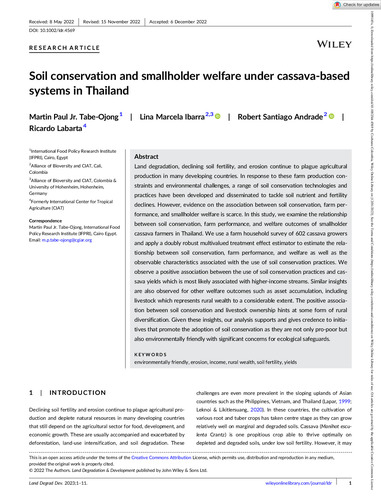Soil conservation and smallholder welfare under cassava-based systems in Thailand
Land degradation, declining soil fertility, and erosion continue to plague agricultural production in many developing countries. In response to these farm production constraints and environmental challenges, a range of soil conservation technologies and practices have been developed and disseminated to tackle soil nutrient and fertility declines. However, evidence on the association between soil conservation, farm performance, and smallholder welfare is scarce. In this study, we examine the relationship between soil conservation, farm performance, and welfare outcomes of smallholder cassava farmers in Thailand. We use a farm household survey of 602 cassava growers and apply a doubly robust multivalued treatment effect estimator to estimate the relationship between soil conservation, farm performance, and welfare as well as the observable characteristics associated with the use of soil conservation practices. We observe a positive association between the use of soil conservation practices and cassava yields which is most likely associated with higher-income streams. Similar insights are also observed for other welfare outcomes such as asset accumulation, including livestock which represents rural wealth to a considerable extent. The positive association between soil conservation and livestock ownership hints at some form of rural diversification. Given these insights, our analysis supports and gives credence to initiatives that promote the adoption of soil conservation as they are not only pro-poor but also environmentally friendly with significant concerns for ecological safeguards.

